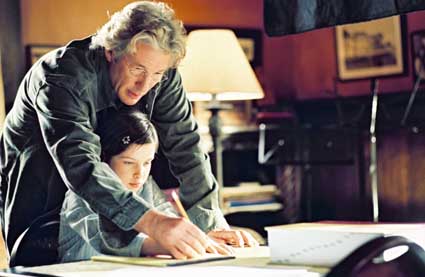

Reviews of Recent Independent, Foreign, & Documentary Films in Theaters and DVD/Home Video
Directed by: Scott McGehee & David Siegel. Produced by: Albert Berger & Ron Yerxa. Written by: Naomi Foner Gyllenhaal, based on the novel by Myla Goldberg. Director of Photography: Giles Nuttgens. Edited by: Lauren Zuckerman. Music by: Peter Nashel. Released by: Fox Searchlight. Country of Origin: USA. 104 min. Rated: PG-13. With: Richard Gere, Juliette Binoche, Flora Cross, Max Minghella & Kate Bosworth.
Just as a child star may have an inordinate amount of responsibility or
control in his or her family, nine-year-old Eliza's emergence as a spelling
prodigy shifts the balance of power in her affluent Berkeley household.
Prior to Eliza's rise in her father's estimation, her teenage brother Aaron
(Max Minghella) basked in Saul's (Richard Gere) attention, spending evenings
performing Bach under Saul's tutelage. But once Eliza hits a winning streak,
Saul's attention focuses on her, and he begins a unique education for his
daughter, combining spelling with Jewish mysticism, believing she has a
special gift to communicate with God as she permutes words backward and
forwards. He becomes the spelling bee's equivalent of a stage mother. After
Eliza wins the regional champion, Saul rushes onto the stage to
embrace her - first Sacramento, then DC.
Lost in the background is Miriam (Juliette Binoche), now observing her
husband controlling Eliza as he had Aaron. Both son and mother react to
their sideline status; he rebels against his faith while her reaction
is more elliptical (even for those who have read the novel). She spends her
days drifting in and out of homes, squalid or upscale. After a fight with
Saul, she drives off like a speed demon into the night. Hovering in the
doorway, Eliza notices the cut on her mother's forehead the following
morning, before Miriam walks out on her husband while still in her bathrobe,
not to be seen for the entire day.
All the scattered subplots would have been made whole had the underlings had
someone stronger to react to. Instead of the novel's looming and demanding
Saul, Richard Gere's pushy and smug paterfamilias is too nice. (Paging Ron Rifkin. Paging Mandy Patinkin.) As a
consequence, both Aaron and Miriam appear to be petulant and overreacting.
The ambiguous script doesn't do Miriam any favors, either. Her motivations come
off as vague; Binoche's heartfelt performance can only fill in so many
blanks.
Gere's casting as a Jewish scholar is less surprising than Kate Bosworth's
beatifically beaming Hare Krishna proselytizer (although she would be any
religion's secret weapon). Unlike the novel, Saul's a professor of religion offering Cliff Notes on kabbalah,
not a temple cantor. Written in the third
person, the novel's dense narrative obviously goes by the
wayside, but without a galvanizing father figure the film falls upon the
shoulders of Eliza, the narrator. Just as Saul thrusts too many expectations
upon his daughter, it's premature to expect newcomer Flora Cross to carry the film.
What was appealing and understandably reserved in print is practically glum
on screen - understated yes, involving no. If the directors told her to act
as if there was no camera, they forgot about the audience. Kent Turner
|